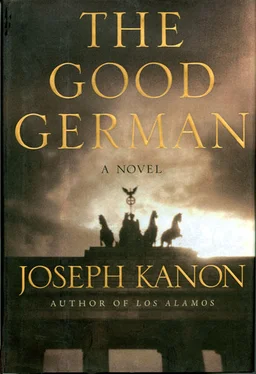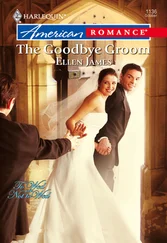He inched down the rubble on his back, as if he were sliding down a sand dune, but the bricks rolled with him, a small avalanche, not sand. In a few seconds they’d hear the clattering over their engine. He crouched, then took a breath and started running down the slope, pitched forward by gravity, flying, so that he thought he’d reach the pavement face first. He staggered from the jolt of hitting flat ground, then hurled himself down the street. How long before they turned? His shoes smacking the pavement now, in shadow and racing south, putting space between him and the wrecked ministry. Getting away with it. Until the air exploded again with a spray of bullets. The Behrenstrasse car, catching his shirt in its lights. He ducked but kept running, looking frantically for another open space in the wall of rubble. Shouts behind him, more boots-probably Sikorsky and his men responding to the gunfire, back in the street.
One long dark stretch, the other Soviet car visible now at the end, standing in the middle of the Voss Strasse intersection, by the Chancellery. Head right somewhere, behind the buildings, the wasteland near Hitler’s bunker. But the rubble ran in an unbroken line here. Shouts in the dark. There would be guards at the bunker, even at night, watching for looters. Who would they think he was, running away from guns? The street would end any second now, with the roadblock, and someone had started firing again, maybe at random, maybe at the pale glow of his shirt.
He swerved right off the pavement into a dark space in the rubble. A cul-de-sac, like a moon crater, one of its rims backing onto the Chancellery itself. He thought of Liz snapping pictures. The long gallery and then the smashed office opening out to the back. No one would be collecting souvenirs now. He clambered up another apron of rubble to the ground-floor window and vaulted through, finally out of the street. He stayed down for a minute, his eyes adjusting to the dark, and started across the room, hitting his shin against an overturned chair, then retreated back to the wall, feeling his way toward the next window. More light here, just faint enough to see that the long gallery was still a mess, a minefield of broken furniture and fallen chandeliers. He moved farther along the wall, avoiding the booby traps of debris in the center. Shouts outside again. They would have reached the roadblock, would be doubling back now to pick their way through the ruins, a rat hunt. Get to the end of the room somehow, toward the bunker. Maybe the guards hadn’t been alerted yet. The element of surprise.
He had reached another chair, stuffing spilling out of the ripped upholstery, when the tall doors banged open, flung back in a hurry. He dived behind the chair, holding his breath, as if even a slight rasp would give him away. Sikorsky with a few men, one of them a Mongol guard from outside. Machine guns and flashlights waving around the still hall. Sikorsky motioned with his hands for them to spread out. For another second no one moved, letting the noisy echo of their entrance die down, then Sikorsky took a step toward the wall with the chair and Jake froze, the back of his neck tingling. Not fear; a trickle of blood running down, soaking into the shirt. How much had he lost?
“Geismar!” Sikorsky shouted into the air, another echo, looking now toward the end of the gallery, where the office and garden windows were. “You cannot leave here.” Not through the garden anyway, and not back into the street either. “No more shooting. You have my word.” All the while motioning to the others to begin their sweep, guns ready. In Stalingrad they’d fought building by building, a war of snipers. “We have Brandt,” he said, cocking his head to hear a reply. Jake let out a breath, half expecting it to echo. But did they? No, they’d raced around the Adlon too fast, not stopping for anything. A poor chess player.
Sikorsky nodded and his men began to move with their flashlights, only one of them left stationed by the door. But armed. Jake followed the lights. They’d sweep to the end, then back, until they were sure. No way to get to the garden. He raised his head a little, glancing out the window. Distract the Mongol, make a break for it across Voss Strasse. But the open car was there at the corner, ready to fire, maybe a second Mongol still posted on the steps. Back the way he had come, to the moon crater? Every step echoing in the giant room, no weapon except a splintered armrest. Endgame.
The Russians were nearing the end of the hall, shining lights into the office where GIs had chipped off pieces of Hitler’s desk. Two of them dispatched to check the room, then back, returning now toward Jake’s end. How many? Four, plus Sikorsky. He heard the crunch of glass, a chandelier globe caught underfoot. Minutes. Then they stopped, heads swiveling, alert to a sound. Had Jake moved, paralyzed behind his chair? No, a different sound, not in the room, getting louder-a pop, a grind of motors, raucous whoops. Jake strained a little closer to the window, looking out. Rumbling down Wilhelmstrasse, almost in the headlights. “It’s over!” he heard in English. “It’s over!” Football game yelling. Then he could see the jeep, soldiers standing with beer bottles, fingers raised in Churchill Vs. In the light now. Americans, like some phantom rescue party out of Gunther’s westerns. If he could get through the window, he’d be almost there. The Russians at the roadblock, too stunned to react, looked around in bewilderment, not knowing what to do. Then, before Jake could move, the GIs, still whooping, started firing into the air, victory fireworks. “It’s over!”
But all the Russians heard was gunfire. Startled, they started firing back, a machine gun strafing the jeep, one GI flung back, then whirling, falling forward over the windshield.
“What the fuck are you doing?” a GI screamed, the reply lost under another barrage of shots.
Then the GIs were crouching, firing too, into the roadblock, and Jake saw, horrified, that it was the Potsdam market again, a confusion of screams and bullets, real combat, men actually going down in the crossfire.
Inside the Chancellery, Sikorsky’s men raced toward the doors, stumbling over pieces of debris, shouting to each other. Gunfire must mean that Jake was out there. They ran out onto the steps, saw the American jeep at the roadblock, and started firing. The Russians in the street, caught by surprise shots from the side, automatically swerved and fired back. Open stairs, nowhere to hide. The Mongol was hit first, falling headlong, the others ducking. Sikorsky yelled out something in Russian, then clutched his stomach. Jake watched, amazed, as he sank to his knees, bullets still raking the columns behind him. “Fuck! Ed’s hit!” somebody yelled. Another round into the blockade from the jeep. Then a hoarse scream in Russian from the steps, and all at once it stopped, the soldiers in the roadblock looking, dazed, at the Chancellery, Sikorsky still kneeling there, his uniform finally visible to them as he rolled over.
“Are you fucking crazy?” the GI yelled, bent over his friend. “You shot him!”
The Russians, crouching for cover, held their guns out, waiting to see what would happen, not ready to believe they weren’t under attack.
“You shoot!” one yelled in broken English.
“You idiot! We’re not shooting. You’re shooting. It’s over!” The soldier took out a handkerchief and waved it, then stepped tentatively out of the jeep. “What the hell’s the matter with you?”
A Russian stood up beside the car and took a step toward him, both holding their guns. Then no one said anything, a stillness you could touch, the others beginning to move from their places in slow motion, staring at the bodies in the street, appalled. The Russian looked toward the steps, terrified, as if he expected to be punished, still not sure what had happened. The Mongol, not dead, called out something, and the Russian just kept looking, stupefied, not even moving when Jake limped out of the building, went over to Sikorsky, and picked up the revolver near his hand.
Читать дальше












